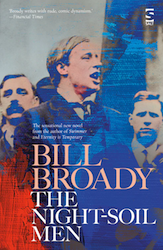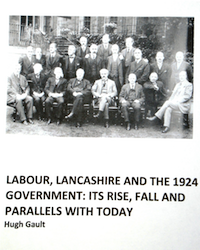MATTHEW BROWN reviews two recent books on the early Labour movement – a hefty historical novel focused on the ILP; and a slim pamphlet on the 1924 government.
There can’t be many novels that open on the morning of the ILP’s founding conference, let alone a contemporary one. But Bill Broady’s latest opus, The Night-Soil Men, does just that with his young protagonist, Jim Sharp, describing a bleak and wintry day in Bradford on 13 January 1893 when “the world was about to be turned upside down but nobody seemed in the least concerned”.
 Nobody, that is, except the 130 delegates who troop through cobbled streets to the Labour Institute where Keir Hardie is waiting to greet them, George Bernard Shaw is haggling for entry and Philip Snowden is keeping a wary eye on his mother.
Nobody, that is, except the 130 delegates who troop through cobbled streets to the Labour Institute where Keir Hardie is waiting to greet them, George Bernard Shaw is haggling for entry and Philip Snowden is keeping a wary eye on his mother.
Many of the well-known names of ILP legend are here – from Bradford striker Ben Tillet to union leader Ben Turner, from photographer Tom Maguire to the magnetic suffragist, Katharine St John Conway. Here too, is the revered Clarion editor Robert Blatchford and Karl Marx’s son-in-law Edward Aveling.
Jim’s companion is fellow-Bradford man and local agitator, Fred Jowett, a key figure at the meeting and a driving force behind this slightly dishevelled yet determined effort to create the country’s first national party for labour.
It’s Jowett who Jim meets up with en route to the historic gathering, and it’s his childhood memory of night-time privy cleaners, and the horrifying stink of excrement in working class streets, that gives the book its title. It gives Jowett his motivation, too.
“We need to begin again,” he tells Jim as they walk. “To build municipal terraces, wide straight streets with trees and lawns, where people can live and work with dignity. And we need new schools with proper teachers, in which every child is guaranteed at least one nutritious meal a day.”
First, though, the new party needs a name. Broady skilfully fictionalises the inaugural meeting’s tortured (and oft-repeated) debate about purpose – reform or revolution, radical movement or electoral machine – a pitch-battle in words that goes back and forth between socialists, Marxists and unionists until Aveling resolves the matter, proposing that ‘Independent Labour Party’ be retained “for now”.
All the frustrating hassles of left-wing politics and democratic compromise are here, brought to life in entertaining prose via the sideways-glancing scepticism of Broady’s half-amused, half-asleep narrator. “All these non-descript little men around him were utterly self-assured, certain of their opinions and right to be here,” thinks Jim.
Power & principle
The ensuing tale focuses on three of those (not so) little men in particular – Jowett, Snowden and especially, Victor Grayson, the ILP’s colourful firebrand whose rise, fall and rise again ended with his sudden and mysterious disappearance in 1920.
The comic, mildly irreverent tone is maintained throughout the novel’s nearly 500 pages as it charts 13 discrete stages of the early movement’s birth, growth and messy maturity, finishing in the mid-1930s soon after the ILP’s infamous split with Labour. Almost every leading socialist of the age appears in some form, often in cameo, while the rapidly changing political and social landscape is laid out in imaginative detail as the plot unfolds.
By the end we find the ageing Jowett, that great campaigner for democratic reform, musing that the “men of the ILP had come and gone and would not be remembered”.
Whether the real Fred Jowett ever spoke those words is beside the point, for Broady has helped ensure they are unlikely ever to come true. His deeply researched, vivid fictional account is, as Will Dunn’s New Statesman review put it back in July, “an evocation of the left’s long struggle between radicalism and electability”.
As such, says Dunn, it is “perfectly timed to the current moment”. “No novel this year will give a better background to the dichotomy of power and principle that is at the heart of our new Labour government.”
 No novel, maybe, but Hugh Gault’s latest historical booklet, Labour, Lancashire and the 1924 Government, offers something similar in non-fiction form, albeit at considerably shorter length.
No novel, maybe, but Hugh Gault’s latest historical booklet, Labour, Lancashire and the 1924 Government, offers something similar in non-fiction form, albeit at considerably shorter length.
Gault’s concern is to chart the short-lived first administration’s “rise, fall and parallels with today”, in particular focusing on a quintet of core cabinet members from Lancashire – Snowden, JR Clynes, Arthur Henderson, Stephen Walsh and Tom Shaw – just five among a third of Labour MPs who were from or connected to that county.
Focusing on their individual stories and particular roles, Gault investigates the fledgling government’s limited achievements, endless difficulties and ultimate demise.
“A century later, the parallels with today are striking,” he concludes. “Being in government does not automatically result in progress; the scope for action is constrained by events, legacy and public opinion; and one person’s free speech may offend someone else.”
Striking parallels indeed.
—-
The Night-Soil Men by Bill Broady is published by Salt and available here for £12.99.
Labour, Lancashire and the 1924 Government: Its Rise, Fall and Parallels with Today by Hugh Gault is published by Gretton Books and available here for £4.75.
Links to ILP Profiles can be found here.
The ILP: Past & Present, a full-colour, up-to-date history of the organisation, is available here for £14.00.


